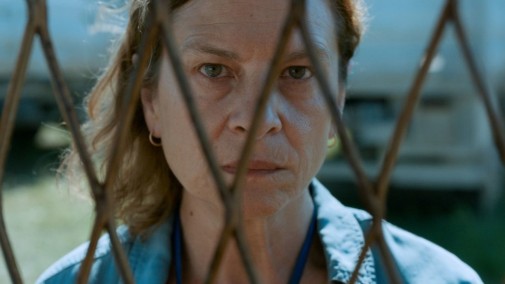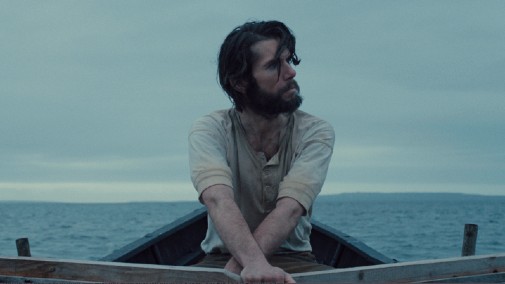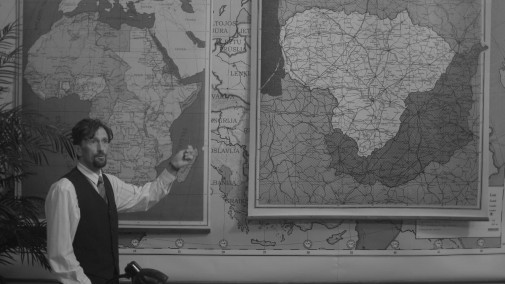Best International Feature: Bosnia & Herzegovina, Ireland, Lithuania
 Friday, February 5, 2021 at 10:00PM
Friday, February 5, 2021 at 10:00PM 
Historical narratives tend to do quite well in the Best International Feature Oscar race. For decades, World War II stories dominated the category though, more recently, this tendency has faded. Every sort of real-life drama enshrined in the appearance of prestigious importance is still catnip for Oscar voters. It's especially true if the film in question is European. Considering AMPAS' tastes, let's look at three submissions from the Old Continent, whose explorations of history differ in fascinating fashion. The Bosnian entry makes a thriller out of a massacre, Ireland draws western stylings from famine while Lithuania revels in the ridiculous ideas that stem from pre-war panic…

QUO VADIS, AIDA? (Bosnia & Herzegovina)
The Srebrenica massacre is one of the darkest chapters of 20th-century European history. In July 1995, more than 8000 Muslim men and boys from the town of Srebrenica were slaughtered by Serbian forces. In their monstrous incompetence, the UN can almost be considered an accomplice in the genocide. Nonetheless, their failure to intervene in this particular situation is just the tip of the iceberg that was the systemic international inaction during the Bosnian War. Jasmila Zbanic dramatizes the horror of those fateful days in the form of a thriller that's the closest cinematic representation of a drawn-out anxiety attack that I've ever seen. The narrative focuses on Jasna Djuricic's titular Aida, a local interpreter working for the UN who's trying to save her husband and two sons. Her performance is as sublime as it is devastating, the portrait of a woman trying to make sense of hell. One often feels as if she's the only sober person in an upside-down world that's full of willful dummies and voracious warmongers. Watching all this unfold is to witness a nerve-wracking nightmare whose bloody destination is known to whoever has a passing knowledge of the Bosnian genocide. Like a master of complicated thrills, the director executes the premise to make it suspenseful, our hearts wrenched by concern over the individual characters' ultimate fates. While experiencing this galvanizing masterpiece, I wanted to scream. Scream until my throat was hoarse and bloody. Quo Vadis, Aida? illustrates the crime of inaction with painful audiovisual and emotional potency, honoring the victims and the survivors who had to live on after staring in the horribly human face of evil. A

ARRACHT (Ireland)
In 1845, the Great Hunger is upon the green island of Europe. The soil is home to the plague of the potato blight, the frigid air smells like rot and tastes like death. It's in this bleak setting that most foul luck is about to befall Colmán Sharkey. When we meet him, he's a fisherman, a good man trying to survive through misery who takes in a veteran from the Napoleonic wars. In no time, violence erupts between his household and the English landlord, with Sharkey finding himself on the run, becoming a fugitive, an outlaw in a lawless world. Director Tom Sullivan shoots the story of this ill-fated man with appropriate severity, making great use of the landscape and blocking his actors in compositions reminiscent of the great westerns of yore. The story has inklings of the mythos immortalized by movies about cowboys, reconfiguring their paradigms to fit a new historical model. The expanse of Monument Valley transformed into the grey rock and verdant moss of the Irish landscape. Overall, it's a worthwhile experiment in the transfiguration of genre conventions, history molded into the shape of ancient tradition and modern tropes. It's a film that simultaneously feels daring and rigidly traditional. Such qualities aren't immune to failure, however. Arracht, also known as Monster, falls victim to the clichéd aspects of revenge flicks, its characterizations thinned out by the demands of tired mechanisms. Unconvincing as a realist drama, a beautiful failure as an allegorical tragedy. C

NOVA LITUANIA (Lithuania)
Before permanently immigrating to the US in 1939, Lithuanian geographer Kazys Pakstas proposed a radical solution to what he saw as the inevitable destruction of his motherland. During the eve of World War II, the powerful forces of Nazi Germany and the Soviet Union threatened to squelch the countries laying in the middle of their conflict, assimilating native cultures with political influence and bellicose threat. Facing such a problem, the geographer thought that the best course of action was to purchase land in Africa, perchance America, thus creating a new Lithuania that would perpetuate the national identity even if the original nation was eradicated. Director Karolis Kaupinis uses this anecdote from the history books to create a debut feature where fact and fiction intermingle, where absurdism flourishes from the anxieties of powerless leaders and zany academics. Whether earnest or cynical, earned or forced upon, the nationalistic identity crisis is intrinsically silly, and the filmmakers never hide that. Instead, they lean into the existentially bleak humor that thrives as a stone-faced deadpan. Despite being shot in digitally polished greyscale and 4:3 aspect ratio, Nova Lituania never looks like an artifact of the past, the modernity of its technique shining through the minimalist set design, disaffected acting style. There's much to appreciate about this clever exercise but the deliberate alienation of the execution sometimes errs on the side of excess, making the film more thought-provoking as a set of academic concepts than as a piece of cinema. B-
I'd be surprised if Quo Vadis, Aida? didn't make the shortlist. The picture's quality, critical acclaim, important subject matter, and high-profile in the festival circuit are sure to make it a big contender, not only for the finalist selection but the nomination too. As for Arracht and Nova Lituania, they seem to be too under-the-radar to factor in the Oscar race. The Irish film is particularly obscure. At least the Lithuanian feature was digitally released through MUBI, so it has more visibility.



Reader Comments (4)
Decent post, worth shirking your duties as the greatest memorialiser that this site, nah the internet has? Maybe.
Thanks again - loving all the coverage on the International race.
Where did you get to see Arracht?
I wasn't a fan of Nova Lituania.
Glad to see that somebody else loved 'Quo Vadis, Aida?' I think if enough voters watch it, it gets in... It feels like it could even be a winner, to be honest. Crossing my fingers.
Hans -- Don't exaggerate, please. Also, writing in memorians and obituaries isn't necessarily something I like to do. I rarely volunteer to do them anyway.
Rod -- Glad someone's appreciating this extensive coverage. I believe I watched ARRACHT either through Deadline's or The Wrap's screening series.
Evan -- I'm right there with you, crossing my fingers and hoping for the best. What an incredible picture.